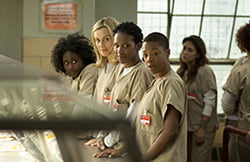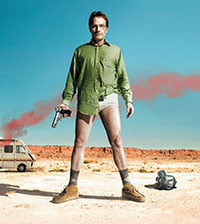The new ‘new’
By Danny Zappin
23-04-2015
As the world becomes more and more connected, it’s also simultaneously becoming increasingly fragmented – the battle for people’s attention has begun.
It’s hard to say what the future of media will look like seeing as we’re currently living in the ‘digital age’ of ‘new-media.’ Not too long ago that’s how we described CD-Roms, CDs and DVDs. Same for the term ‘social media’ – that used to describe Friendster and MySpace. Now all media is social media, all media is digital and everything is new. We might even need a new term for the word ‘new.’

Orange is the New Black
The entertainment and media business as we know it has been turned upside down and we’re left wondering how to make sense of the noise and rapidly changing landscape, let alone predict what its future will be. It’s an exciting time – I love the chaos to some extent, yet I also have a deep desire to calm the noise to bring clarity and quality storytelling to the world. This is, I believe, how to do it:
Foster participation rather than viewership
The days of music artists selling 30 million albums and television shows getting 40 million viewers on a regular basis are long gone. Distribution has become fragmented and democratised thanks to technology and the internet.
Television went from three channels to 300 in a blink. Then YouTube took that number to millions of channels overnight. The music and entertainment industries will never be the same. New models are developing and evolving, and engagement is the key.
Consumers want to be part of the experience, whether that’s an entertainment experience, a brand experience or even a news experience. Individuals and viewers will control most of the creation and distribution of content – not the traditional studios and networks. We shouldn’t look at viewers as passive bystanders. Today they’re part of the story and distributing themselves and will be even more so in the future. This is all part of the democratisation of content creation, distribution and consumption.

Breaking Bad
Personal connection to talent and content is key
I believe we are now experiencing a renaissance – a Golden Age of media and entertainment. The barriers to entry have been completely removed and ‘social media influencers,’ i.e. ‘YouTubers,’ have captured huge followings. And those millions of followers feel a personal connection to the talent/content despite the very low-budget nature of the shortform videos, tweets or photographs being distributed.
The content feels more authentic and organic, less ‘produced’ and corporate. Generation X, Y and Z are connecting to this type of content far more than traditional media outlets, and this will continue. Individuals operating on their own accord versus a coordinated corporate media effort are now driving news, social commentary/parody and documentary content – creating quality connections with a unique perspective on the world.
Technology and new experiences will drive audiences
Just as sound, colour, TV, HD and 3D improved our entertainment, audiences will continue to flock to new tech advances in the name of new experiences. So the more difficult question to answer is how long can you hold them before they get bored and look for what’s next?
We’ve seen the classic mid-level-budget character-driven movies of the ’70s and ’80s disappear to be replaced by the blockbuster franchise fanfare of late. Special effects/3D, star-driven vehicles are what drive box office today. Next, holographic experiences will draw audiences into theatres.
Go big or go small
The middle is disappearing. While the fragmented social influencer network of content creators is attracting huge attention from viewers at one end, the hour-long TV drama has recently asserted its dominance on the media and entertainment world, producing some of the best storytelling and character development ever.
It’s exciting to see all of the new shows that, in my opinion, trump any feature film experience with the depth of storytelling afforded in the multi-season story arch format. The success of HBO’s The Sopranos and Sex & the City and AMC’s Mad Men and Breaking Bad led to Netflix’s House of Cards and Orange is the New Black in turn, creating the deeply passionate binge-watching that was never possible before VoD and SVoD.
TV is now scrambling to compete with online platforms and more money than ever is going into high-end, multi-season dramas. This will continue to grow in the future until the field gets too crowded and the content becomes diluted, but one thing is for certain – the connection to people and characters will never go away, no matter where technology and formats takes us.















.jpg)




























